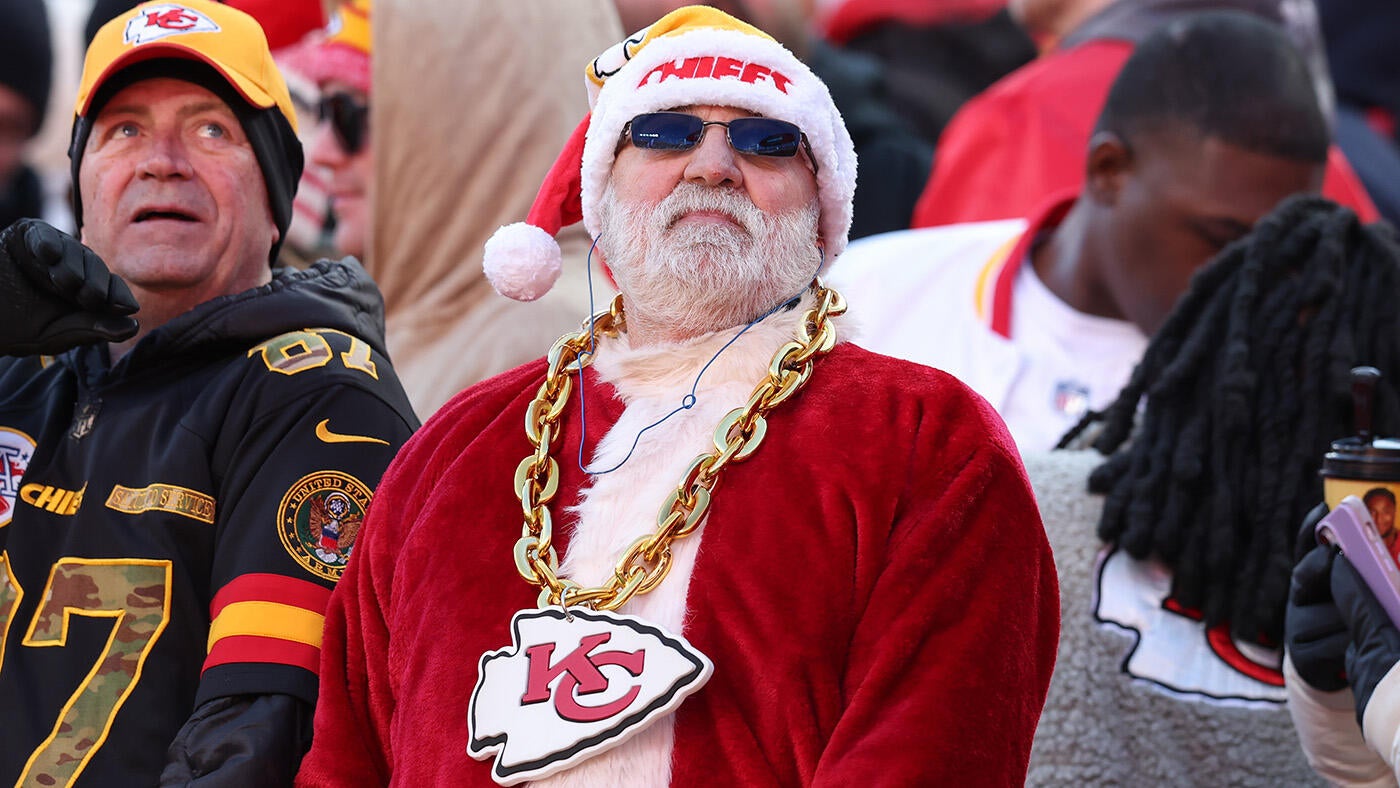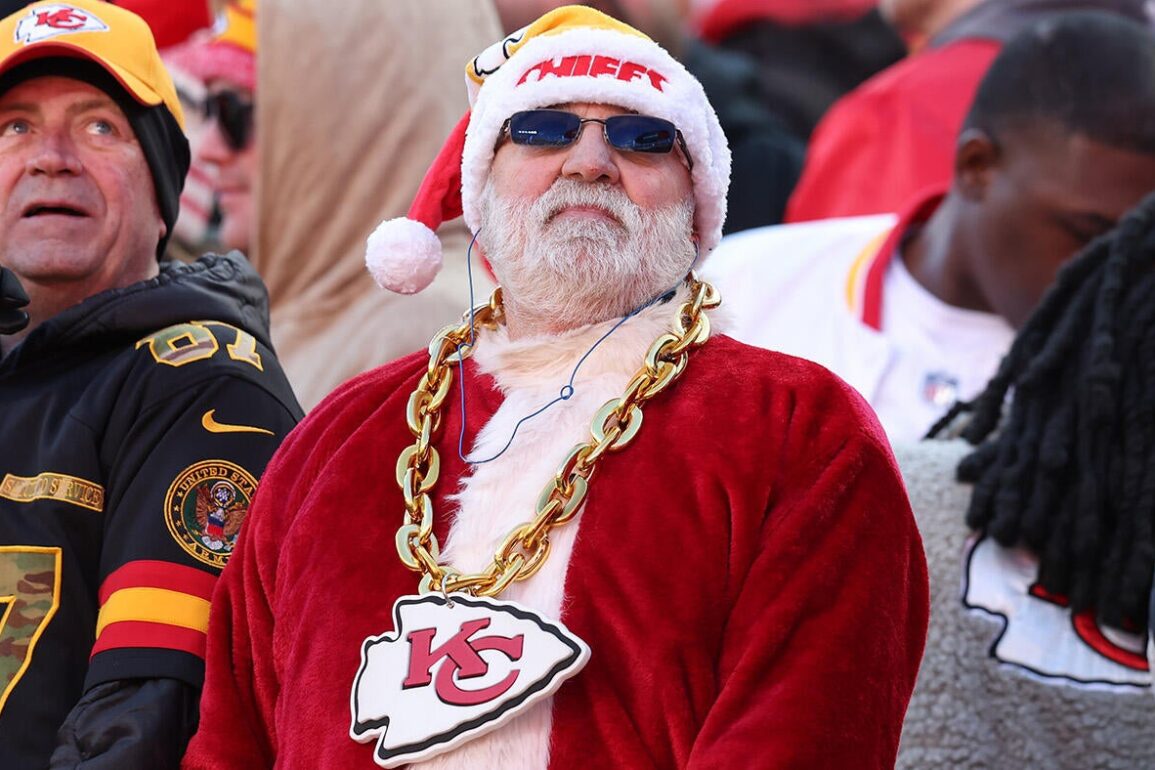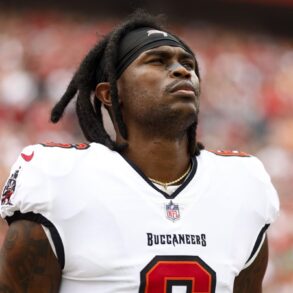
PALM BEACH, Fla. — The NFL‘s annual league meetings came and went this week with the most drama circulating around a tabled rules proposal for a play that accounts for less than a half a percent of all offensive snaps.
While we all talked about the Tush Push, there was hardly a formal mention of the prospect of adding an 18th regular-season game. An ambition of the NFL’s for more than a decade, that grail was “not a focus of our discussions by any stretch of the imagination” over the two-day meetings, NFL commissioner Roger Goodell said.
In truth, it didn’t need to be spoken. As one source pointed out in the lobby of the famed Breakers hotel in Palm Beach, the idea of an 18th game was treated like “a fait accompli” even though it must be collectively bargained with the NFL Players Association. It seems so certain there’s almost no consternation among NFL team owners about even when it will take place, as several sources have believed it wouldn’t be instituted until the 2027 season at the earliest.
All the pieces matter here. There was no formal presentation from the league to team owners and presidents about what exactly the 18th game would look like. Dallas Cowboys owner and strong 18th-game proponent Jerry Jones even said there was no discussion of it in the privileged session, which admits just one representative from each team to discuss what other ears shouldn’t hear.
But when you listen closely to what was said publicly, it becomes clear the league wants — nay, needs — the 18th game to accomplish so many of its goals in the coming years.
Want to take over the globe? You need more games across the globe. Want consistent refurbishments for your stadiums, or even a brand-new one? More money coming in would help. Want to maximize just how much money this extra game will net you? Time it up nicely with your new broadcast deals.
Oh, yeah. Then there’s the whole player health-and-safety thing.
Player safety
The National Football League revolves around quarterbacks. Never before have quarterbacks had so much value to the on-field product, and never before have they been paid as much as they are today.
But the league has seen a historic number of QBs play in a season ever since expanding to 17 games. In 2021, the league’s first year with 17 games, there were 62 starting quarterbacks, most in a season in more than a decade. That was followed by an all-time record of 69 starting quarterbacks in 2022, and it dipped to 66 in 2023 — the second-most all time.
This past season that number went down to 59, so perhaps something is working with consecutive years of that number decreasing.
Quarterbacks aren’t the only players on the field that need to stay on the field, though, and the league knows that. NFL players suffered the fewest concussions in a season since the league began tracking data nine years ago, a positive sign that the tweaks made to the game and associated helmet technology is working.
And the league is doing its part to further curb plays that have a high injury rate. Even though the Tush Push has a 0 percent injury rate, sources say medical professionals consulting with the league caution the NFL and its teams about the potential for catastrophic injury. It’s possible, if not likely, all pushing and pulling of ball-carriers will be outlawed by the time owners reconvene at the May meetings.
The 2024 season also saw second-fewest punts-per-game in the modern NFL. Punt plays have a much higher injury rate than scrimmage plays. With more teams going for it on fourth down than ever before, and with the kickoff touchback now at the 35-yard-line, there may be even fewer punts moving forward.
Logistics of 18 games
On a basic level, one of the easiest parts of the entire 18-game conversation is scheduling. The cleanest way to accomplish this would be to remove one of three preseason games, start the regular season on Labor Day weekend, add a second bye week for all teams and then have the Super Bowl align with Presidents Day weekend.
The next two Super Bowls have their dates set, but not the Super Bowl to cap off the 2027 season. Super Bowl LXII is set to be played in Atlanta in February 2028, but no firm date has been announced, causing many around the league to speculate the league could expand to 18 games beginning in the 2027 season.
Scooting the start of the season up by a week and eliminating one preseason game is just a start. The union has pushed for shorter offseason programs for years, and that push is likely to continue in any negotiations around an 18th game. Eliminating the voluntary offseason program altogether is a hope of some in the union, especially veterans.
An entirely revamped offseason schedule is possible. Training camp could start earlier in July and include a longer ramp-up time. That would eat into the summer breaks for players’ families, which has had many question why players would want such a schedule.
When it comes to the actual season, the players union would never view a second bye week as a “concession.” A second bye week would be nonnegotiable for the players. And, again, on a basic level, the bye weeks would be spaced out evenly for teams that could effectively cut their seasons into thirds.
The league would need to figure out what teams would play the extra game. Does the entire scheduling formula get re-evaluated? Or does the 18th game become a seventh division game that rotates each year within the division, as an example?
“We’ll continue to analyze and discuss it with the players,” Goodell said. “They’re doing their work on it, and we’ll all do our work on it. A lot of things effect whether you would go to 18: all the health and safety issues. I think that gives you the ability to think about that. In the context of our season structure is an important element of what we’re offering to our fans and how we do that and how we’re working with our players.”
The extra game — and more importantly, the added bye week — gives the league a clear runway to 16 international games in the future. Goodell has talked fondly of this idea while his plans for global domination have been clear for more than a decade. But that part isn’t always easy.
The league got the ability to have as many as eight international games beginning in the 2025 season, but the NFL could only muster seven for the upcoming season. The NFL is playing regular-season games in Ireland and Spain for the first time ever, and after years of being in Germany, the league is finally making its debut in Berlin this year.
And there will be more. The CBA allows for the league and union to meet and agree on increasing the total to 10 or more as early as before the start of this season.
Each year more teams get global marketing rights in various countries. Before last week, there were seven teams that did not have global marketing rights in another country. But at the annual meetings, the Ravens, Packers, Chargers and Commanders all got into the mix. That leaves just the Bengals, Bills and Titans as the only teams without a global marketing rights partnership for now.
The league is also expanding into different countries. The Spanos-owned Chargers just got awarded Greece, and the league has set its sights on the United Arab Emirates the last few years. The Commanders, 49ers and Rams all claimed the UAE at the meetings.

Value of an 18th game
Last year the NFL pulled in more than $20 billion in revenue, and that number will only increase as years go along regardless of whether another game is added.
Jerry Jones has known about the value of the 18th game for more than a decade. In the 2011 negotiations for a new CBA, Jones had the personal responsibility of talking to the players about the value of adding an 18th game.
“So you see what a great job I did,” Jones quipped this week. “It was talked about there and I thought it was a great idea there. (Would have) made a billion dollars more to the players back then. One billion more to the players. So I thought it was a good idea — still do.”
Today that extra inventory is valued at a far greater price. And because the added game would allow the league to get to 16 international games more expeditiously, the NFL could also package those international games and sell them to the highest bidder. Many around the league have wondered if such a package would be destined for Netflix considering its international reach. The streamer and the league have become fast friends since Netflix agreed to a three-year deal to house Christmas Day games, and Netflix CEO Ted Sarandos did a panel with Goodell at the league meetings this past week.
Speaking of broadcast deals, the one the league signed with its partners in 2021 doesn’t expire until after the 2033 season. But many anticipate the league will execute its opt-out clause following the 2029 season to get more money for their games. There is no larger pool of revenue for the league than its broadcasting deal.
“I’m more optimistic about how it grows from here than I was when I first came into the NFL in 1989, and any period in between,” Jones said this week. “I see a lot of positive growth for the NFL.”
There is logic in either getting to 18 games for a year or two and then opting out of the deals, or having the 18th game addition coincide with that opt out ahead of the 2030 season.
That’s how the money would work for the owners’ side. For the players, the money would increase and so would the salary cap. Last year we explored many of the potential requests the players could have when it comes to negotiating around an 18th game. There’s little doubt the players will want a greater share of the revenue, and increasing their percentage from 48.8 to something closer to 50 percent would be a coup.
A new potential negotiating point has emerged since then. Sources say the union has shown interest in securing equity in NFL teams for its players, which would be a breakthrough in the most profitable sports league in North American sports.
Team owners voted last year to allow private equity groups to hold up to 10 percent in teams. A handful of teams have indulged in that already, and the benefits are obvious. Team owners whose wealth is mostly tied up in the team itself get to give away a part of the team, without losing any control, and immediately get hundreds of millions of dollars.
Former players have bought into teams, like Tom Brady and Richard Seymour getting pieces of the Raiders. A private equity firm fronted by Hall of Famer Curtis Martin is one of a dozen groups permitted to buy into NFL teams. But active players having a piece of the team? That would be a new frontier.
In July 2023, NFL team owners passed a new rule that resolved “that the membership endorses and adopts the policy statement of the Finance Committee regarding transactions of club equity involving club employees who are neither Principal Owner nor a member of the Principal Owner’s family,” according to a document obtained by CBS Sports.
So the NFL has already anticipated such a request and passed a bylaw to prohibit it. Of course, rules can always be changed. But it seems hard to imagine the league will ever allow a player to own part of the team he’s playing on, considering the complications when and if that player is traded or cut — not to mention the potential circumvention of the salary cap.
But could current players buy into private equity groups who can then buy into teams? Maybe that could be a negotiated work-around for all parties, but that is hardly a given.
Could product suffer?
The pros of adding an extra game are rather obvious when it comes to money. And the cons of more injuries are equally as obvious. But something else that worries the league when it comes to more games: a more diluted product.
Those within the league office are terrified about the potential for teams to tank if more games are added. The NFL has seen what has happened in recent years with the NBA, and the potential to bottom out only increases when more bad teams play more games.
The NBA has borrowed from soccer to introduce an in-season tournament, though no major North American sports league has gone as far as to introduce a relegation system. And an in-season tournament for the NFL would have its own set of unique challenges.
But the league has been fighting tanking for decades. The problem has only gotten worse in recent years as one of the biggest tools in team-building has been a quality quarterback on a rookie contract.
Some general managers have pushed for the trade deadline to be later in the season, but the league has balked at doing that in large part because of the tanking concerns. The deadline now takes place after Week 9 in an 18-week (and 17-game) season, and pushing the deadline later could make more teams sellers as they watch their season slip away.
Though the stats say the league had its most competitive year ever when it comes to close games, the 2024 NFL season saw many bad matchups down the stretch as playoff seeding was more or less locked in with a couple weeks left in the season. Logic holds that adding another game would just worsen the problem.
Enter the Detroit Lions‘ proposal to change playoff seeding. The Lions proposed to change playoff seeding to rank teams from No. 1 to 7 based off record. Winning the division would get teams into the playoffs, but it wouldn’t guarantee them a home playoff game like it does now.
That proposal got tabled at the meetings, but it had support from teams like the Cowboys. While some teams believe in the “purity” of divisions, like Steelers coach Mike Tomlin alluded to this week, others like the Cowboys see that more competitive games down the stretch will bring more eyeballs to the NFL. And all of that means more money for everyone.
Already one out of four division teams has a chance to host a playoff game each season. This proposal would allow four conference teams out of 16 to host a playoff game, so the basic math doesn’t change.
When I asked him this week about that proposal, Goodell didn’t hide his interest in it.
“I thought it is a very healthy proposal and a very healthy point that we need to evaluate and continue to look at. It went through many different forms. There was some great data to show that we should really look at some form or version of this. But there was also a really strong point of view that winning the division was the No. 1 thing. When you come into training camp, that’s the goal: win that division first. And should that reward for winning that division be you’re in the playoffs and a home game?
“There was some discussion potentially about if you’re .500 or less and you won that division, should you also get the home game? I think there was some interest in that also. But I think the reality is it was very healthy and I think there will be more discussion of it. As we look at the season structure, there will probably be a lot of discussion in that context also as we do that. But I do think it’s that constant work to be more competitive and find new wasty to create interest in the game.”
It was the second time in his press conference Goodell referred to the “season structure,” and it provided a glimpse into the future. Even though an 18-game schedule wasn’t on the agenda, the idea of it informs what is being discussed.
If players are going to play more, they need to stay healthy. If there are going to be more international games, there need to be more countries the NFL enters. And if more games could hurt the quality of the product, then measures need to be put in place to ensure that doesn’t happen.
The 18th game is the key to all this for the NFL.
This post was originally published on this site be sure to check out more of their content.






